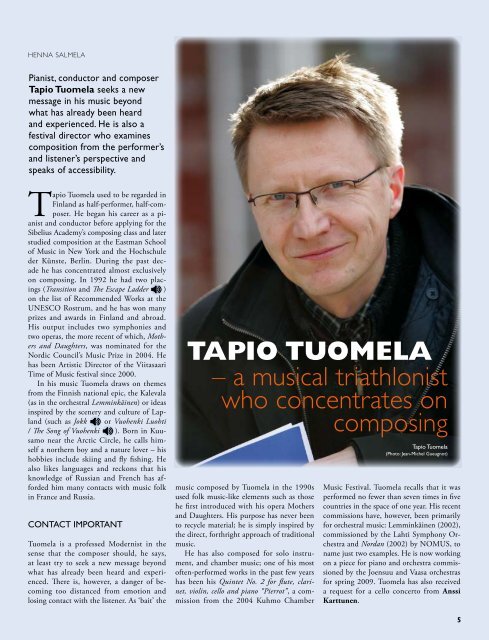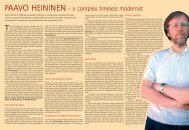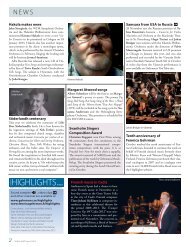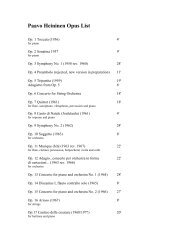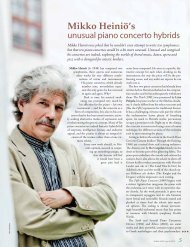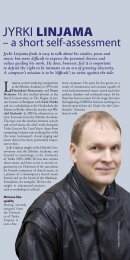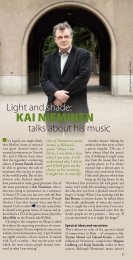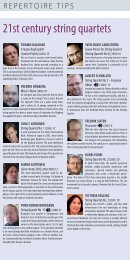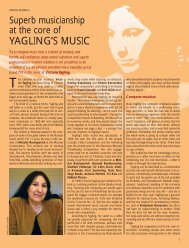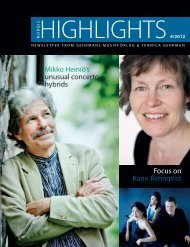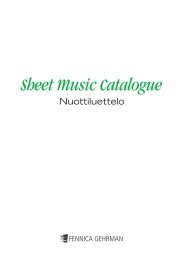TAPIO TUOMELA – a musical triathlonist who ... - Fennica Gehrman
TAPIO TUOMELA – a musical triathlonist who ... - Fennica Gehrman
TAPIO TUOMELA – a musical triathlonist who ... - Fennica Gehrman
Create successful ePaper yourself
Turn your PDF publications into a flip-book with our unique Google optimized e-Paper software.
Henna Salmela<br />
Pianist, conductor and composer<br />
Tapio Tuomela seeks a new<br />
message in his music beyond<br />
what has already been heard<br />
and experienced. He is also a<br />
festival director <strong>who</strong> examines<br />
composition from the performer’s<br />
and listener’s perspective and<br />
speaks of accessibility.<br />
Tapio Tuomela used to be regarded in<br />
Finland as half-performer, half-composer.<br />
He began his career as a pianist<br />
and conductor before applying for the<br />
Sibelius Academy’s composing class and later<br />
studied composition at the Eastman School<br />
of Music in New York and the Hochschule<br />
der Künste, Berlin. During the past decade<br />
he has concentrated almost exclusively<br />
on composing. In 1992 he had two plac-<br />
ings (Transition and The Escape Ladder<br />
on the list of Recommended Works at the<br />
UNESCO Rostrum, and he has won many<br />
prizes and awards in Finland and abroad.<br />
His output includes two symphonies and<br />
two operas, the more recent of which, Mothers<br />
and Daughters, was nominated for the<br />
Nordic Council’s Music Prize in 2004. He<br />
has been Artistic Director of the Viitasaari<br />
Time of Music festival since 2000.<br />
In his music Tuomela draws on themes<br />
from the Finnish national epic, the Kalevala<br />
(as in the orchestral Lemminkäinen) or ideas<br />
inspired by the scenery and culture of Lapland<br />
(such as Jokk or Vuohenki Luohti<br />
/ The Song of Vuohenki ). Born in Kuusamo<br />
near the Arctic Circle, he calls himself<br />
a northern boy and a nature lover <strong>–</strong> his<br />
hobbies include skiing and fly fishing. He<br />
also likes languages and reckons that his<br />
knowledge of Russian and French has afforded<br />
him many contacts with music folk<br />
in France and Russia.<br />
ContaCt imPortant<br />
Tuomela is a professed Modernist in the<br />
sense that the composer should, he says,<br />
at least try to seek a new message beyond<br />
what has already been heard and experienced.<br />
There is, however, a danger of becoming<br />
too distanced from emotion and<br />
losing contact with the listener. As ‘bait’ the<br />
)<br />
<strong>TAPIO</strong> <strong>TUOMELA</strong><br />
<strong>–</strong> a <strong>musical</strong> <strong>triathlonist</strong><br />
<strong>who</strong> concentrates on<br />
composing<br />
music composed by Tuomela in the 1990s<br />
used folk music-like elements such as those<br />
he first introduced with his opera Mothers<br />
and Daughters. His purpose has never been<br />
to recycle material; he is simply inspired by<br />
the direct, forthright approach of traditional<br />
music.<br />
He has also composed for solo instrument,<br />
and chamber music; one of his most<br />
often-performed works in the past few years<br />
has been his Quintet No. 2 for flute, clarinet,<br />
violin, cello and piano “Pierrot”, a commission<br />
from the 2004 Kuhmo Chamber<br />
tapio tuomela<br />
(Photo: Jean-michel Gueugnot)<br />
Music Festival. Tuomela recalls that it was<br />
performed no fewer than seven times in five<br />
countries in the space of one year. His recent<br />
commissions have, however, been primarily<br />
for orchestral music: Lemminkäinen (2002),<br />
commissioned by the Lahti Symphony Orchestra<br />
and Nordan (2002) by NOMUS, to<br />
name just two examples. He is now working<br />
on a piece for piano and orchestra commissioned<br />
by the Joensuu and Vaasa orchestras<br />
for spring 2009. Tuomela has also received<br />
a request for a cello concerto from Anssi<br />
Karttunen.
One of the most interesting projects<br />
now in the pipeline is Antti Puuhaara, a<br />
sort of melodrama or folktale for narrator,<br />
instrumental ensemble and eight-part vocal<br />
ensemble. It has been commissioned by<br />
Musicatreize of France, directed by Jean-<br />
Claude Berrutti and will be premiered next<br />
spring in the “Finlandais” season in Paris. It<br />
is also to be released as a DVD. Though it<br />
includes a narrator and spoken dialogue, it<br />
is essentially choral music, a genre familiar<br />
to Tuomela.<br />
Just completed is an Organ Mass scheduled<br />
to be premiered in Stavanger in autumn<br />
2008. Parts of it have already been<br />
performed in Espoo in autumn 2007, and<br />
Tuomela has since added three more movements.<br />
He is also planning a set of bilingual<br />
songs: settings of the same poem in two<br />
languages. “Language and articulation have<br />
been dictating the texture ever since the days<br />
of Monteverdi,” he says, mentioning Emily<br />
Dickinson, Christian Morgenstern, Niilo<br />
Rauhala and T. S. Eliot as poets <strong>who</strong> appeal<br />
to him. Soprano Soile Isokoski and pianist<br />
Marita Viitasalo have promised to perform<br />
the first of these song pairs.<br />
HaCkinG at tHe sCore witH a<br />
maCHete?<br />
In 2003 Tuomela put the finishing touches<br />
to an orchestral work he calls Lappic.double<br />
(Double Sinfonietta) not yet performed in<br />
full. The material is from a work he composed<br />
for the Provincial Museum of Lapland<br />
and one movement of it was played in<br />
a concert by the Chamber Orchestra of Lapland.<br />
An ambient work designed to be heard<br />
at the Museum, it is located in three rooms<br />
so that the sounds mingle in a fascinating<br />
way. The plan is for the work to be a feature<br />
of the Museum for ten years, and according<br />
to the provincial daily Lapin kansa it may<br />
have up to a million listeners in the space<br />
of one decade.<br />
The Symphony No. 2 of 2005 commissioned<br />
by the Finnish Broadcasting Company<br />
(YLE) has also had a large audience as<br />
the concert by the Finnish Radio Symphony<br />
Orchestra was broadcast. It got an enthusiastic<br />
reception and the critics praised its<br />
beautiful, translucent sound. The composer<br />
must, says Tuomela, be fully convinced<br />
of a work’s merits when it passes out of his<br />
hands, but he has nothing against revision<br />
at a later date. He is in fact right now compressing<br />
his Second Symphony so that it will<br />
last under 30 minutes in performance.<br />
With his long experience of conducting<br />
tuomela’s opera mothers and Daughters (Photo: Finnish national opera/Heikki tuuli)<br />
and working with musicians, Tuomela tries<br />
to make his notation clear and performerfriendly.<br />
Musicians often get frustrated, he<br />
says, by uneconomical notation and have<br />
difficulty motivating themselves into attacking<br />
the job on hand with a clearing saw<br />
or machete. “The notes as they sound are<br />
frequently at odds with those on the page,<br />
and the players often ask in rehearsal why<br />
the composer had to express something that<br />
simple in such an awkward way,” he says.<br />
“Maybe some composers have no practical<br />
personal experience of ensemble work.”<br />
Tuomela himself was for a long time a rehearsal<br />
conductor at the Finnish National<br />
Opera.<br />
More attention will, he feels, probably be<br />
paid to this now that rehearsal times have<br />
become significantly shorter in Finland than<br />
they were “in the good old days”.<br />
aCCessibility<br />
And what about the audience, the people<br />
<strong>who</strong> actually listen to the music? Does<br />
Tuomela’s role as a festival director afford<br />
him new perspectives on composition and<br />
is he, as gatekeeper, more or less obliged to<br />
view composing from a different, broader<br />
perspective? This is, he agrees, an interesting<br />
subject, the key word being accessibility.<br />
In addition to being a creative composer, he<br />
tries to approach his music from the listener’s<br />
angle. In piloting the Time of Music festival<br />
at Viitasaari he tries to regenerate ideas<br />
and to bring different actors together by introducing<br />
such genres as pop, folk and religious<br />
music, and music & text or image. He<br />
feels he could perhaps start asking himself<br />
<strong>who</strong>m the work is intended for and in what<br />
context. Why should, say, the audience at a<br />
concert of orchestral and opera music not be<br />
seen as having a different profile from that at<br />
a chamber recital? Because, he claims, they<br />
really are different.<br />
While the composer should be aware<br />
of this, he should not, according to Tapio<br />
Tuomela, be prepared to make concessions<br />
over his vision or conscious compromises.<br />
Every composer must have his own credo,<br />
and he is ultimately accountable for his<br />
choices to himself alone. But Tuomela does<br />
admit that the idea may be reflected subconsciously<br />
in his style; it may hover in the background<br />
and influence him in just the same<br />
way as, for example, the composition teacher’s<br />
finger raised in warning in the recesses of<br />
the mind or the predictable, presumed reaction<br />
of the critical listener. Tuomela is not<br />
bothered by reviews, because they lag so far<br />
behind the composition process that by the<br />
time they are printed the composer could<br />
scarcely care less what they say.<br />
What, then, can the composer expect of<br />
the future? Greater openness and liberation;<br />
ever closer contacts with the player and listener.<br />
Tuomela lists some concrete hopes: it<br />
would be nice to hear Nordan or the new,<br />
shorter 2002 version of Lemminkäinen performed<br />
in Finland. And the Sibelius Academy<br />
is giving a concert dedicated to his<br />
chamber music in September 2008. “Hopefully<br />
we’ll hear some new songs, too!” n<br />
sound samples are available at<br />
www.fennicagehrman.fi (highlights)


